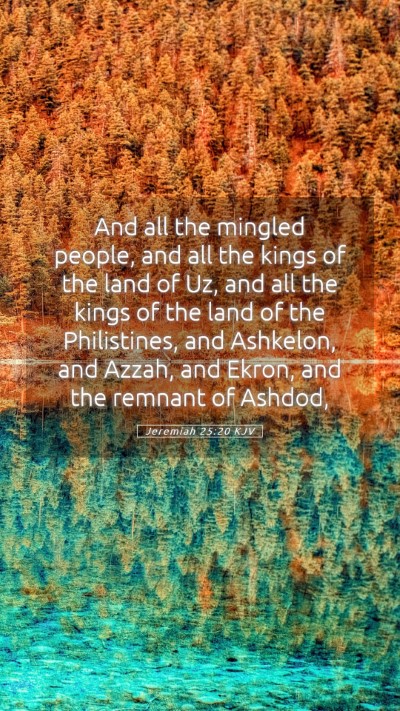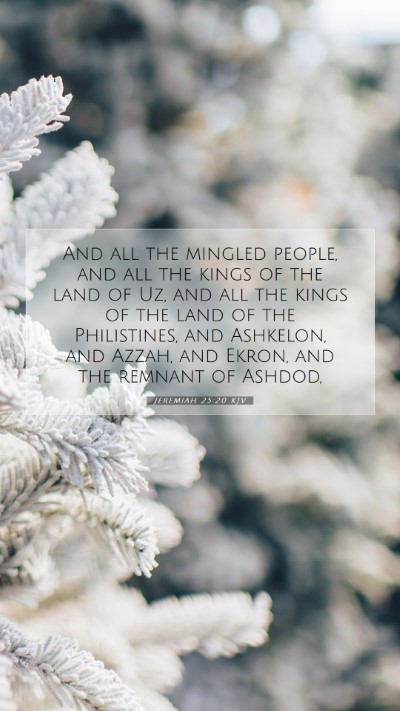Bible Verse Meaning: Jeremiah 25:20
Verse Reference: Jeremiah 25:20 - "And all the foreign people, and all the kings of the land of Uz, and all the kings of the land of the Philistines, and all the kings of Tyre, and all the kings of Zidon, and the kings of the isles which are beyond the sea."
Overview
This passage is part of Jeremiah's prophecy detailing God's judgment upon various nations. Throughout the book of Jeremiah, the prophet warns of impending doom due to the disobedience of the people of Israel and their neighboring nations. The verse lists various foreign nations that are subject to this divine judgment, emphasizing the widespread nature of God's authority.
Bible Verse Interpretations
-
Matthew Henry:
Henry explains that this verse underscores God's sovereignty over all nations. Its listing of specific kingdoms illustrates that God's judgment is universal, affecting not just His chosen people but also their neighbors and adversaries. Henry sees this as a reminder of God's ultimate authority over all earthly powers.
-
Albert Barnes:
Barnes focuses on the significance of the foreign nations listed, indicating that they represent various facets of idolatry and rebellion against God. He notes that each king and kingdom mentioned had their own sins, and therefore faced God's judgment, reinforcing the idea that no one can escape His reach.
-
Adam Clarke:
Clarke emphasizes the geographical and sociopolitical implications of the listed nations. He suggests that Jeremiah’s mention of these nations serves as a warning not just to Israel but to all surrounding territories susceptible to God’s wrath due to their collective transgressions.
Understanding Scripture
This verse conveys significant aspects of biblical prophecy — the certainty of divine judgment, the interconnectedness of nations, and the overarching theme of accountability before God. It serves as a precursor to the calamity faced by these nations, which is a recurrent theme throughout Scripture.
In-Depth Bible Verse Analysis
The historical context reveals that Jerusalem was under threat from Babylonian forces at the time of Jeremiah's prophecy. The geographical regions mentioned were not only neighbors but also represented various alliances and hostile relations towards Israel. This context enriches our understanding of the dynamics between these nations.
Application of Bible Verses to Daily Life
In modern application, the verse reminds us that nations, like individuals, are subject to moral laws. Reflecting on the nature of our actions and the consequences they bear is essential for personal and communal accountability. Therefore, Jeremiah’s message encourages introspection regarding our personal relationships and societal conduct.
Cross References
- Jeremiah 46:1-2: Prophecy against Egypt
- Ezekiel 25: Prophecies against the nations
- Isaiah 34:1-2: The Lord's fury against the nations
Conclusion
This exploration of Jeremiah 25:20 provides valuable Bible study insights for understanding God's judgment and the interconnected nature of biblical narratives. Delving deeper into Bible verse meanings can significantly enhance one's Bible study resources and foster a more profound grasp of Bible verse interpretations.
For those engaging in bible study groups, this verse serves as an excellent topic for discussion, offering opportunities to explore themes of prophecy, divine justice, and the nature of human governance under God's authority.


